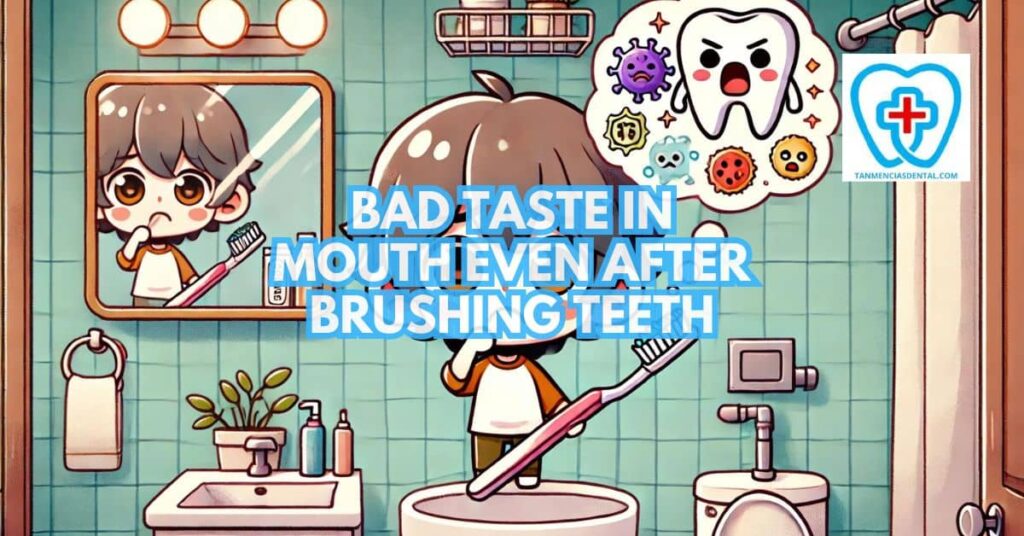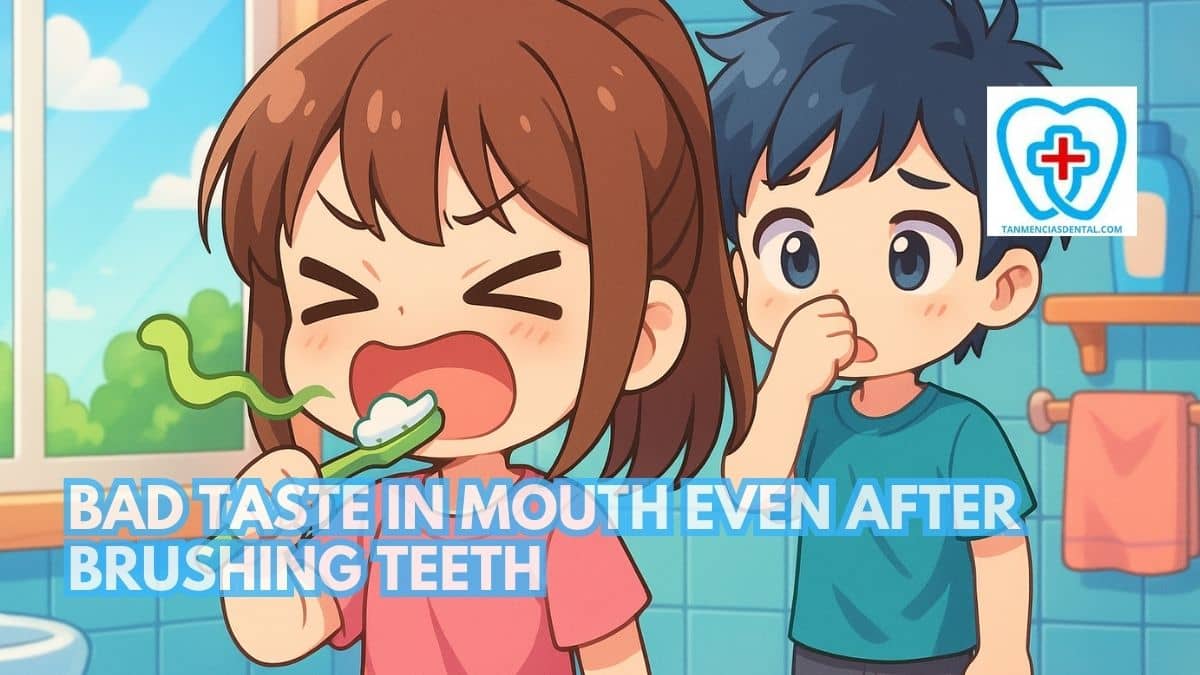Many people notice a bad taste in mouth even after brushing teeth, and it can feel both strange and worrying.
This problem is not always caused by poor brushing and may be linked to other hidden issues.
Foods, medicines, health conditions, and lifestyle choices can all play a role in how your mouth tastes.
Learning about these possible causes can help you understand why the problem happens.
By knowing the reasons, you can take the right steps to improve both your oral health and overall well-being.
1. Common Culprits Behind Persistent Bad Breath
Persistent bad breath, also called halitosis, often begins with poor oral hygiene practices that allow bacteria to grow.
Failing to brush and floss carefully can leave food particles stuck between the teeth and on the tongue, which then break down and release strong odors.
Certain foods, such as garlic, onions, and spicy dishes, can leave an unpleasant taste that lingers long after eating.
Drinks like coffee and alcohol can also dry the mouth and make halitosis worse.
In addition, habits like smoking or chewing tobacco coat the mouth with chemicals that cause both a strong odor and a lasting, unpleasant taste.
Poorly cleaned dental appliances, such as dentures or retainers, can trap food and bacteria that add to the problem.
Understanding these common culprits can help you take simple steps to protect your breath and keep your mouth feeling fresh.
🦷 How Often To Brush Teeth With Braces and Keep Them Cavity-Free
2. Health Conditions That Can Cause Bad Taste
Several health conditions can lead to a bad taste in your mouth.
Sinus infections can cause a postnasal drip, which affects your sense of taste.
Acid reflux is another common cause, as stomach acids can travel up to the mouth, leaving a sour taste.
Diabetes can lead to high blood sugar levels, which may result in a metallic taste.
Identifying and managing these conditions is crucial for improving your oral health and overall well-being.
🦷 How a Diet for Gingivitis Can Improve Your Gum Health
3. Medication Side Effects on Taste
Some medicines can change how food and drinks taste in your mouth, and the effect may be strong enough to notice right away.
Antibiotics, antihistamines, antidepressants, and blood pressure medicines are well known for causing a bitter taste or even a metallic taste that lingers.
This happens because certain drugs can interact with the taste buds or reduce saliva, which makes flavors seem different.
The change in taste can last as long as you are taking the medicine and may return to normal once the medicine is stopped.
Many people think poor brushing is the cause, but in reality, the bitter taste often comes directly from the medicine itself.
If the taste problem continues or affects daily comfort, it is important to talk with a doctor or dentist who can suggest alternatives or ways to reduce the side effect.
🦷 Can Mouthwash Cure Sore Throat? Don’t Gargle the Wrong Answer!
4. The Dry Mouth Connection: A Taste Issue
Dry mouth, or xerostomia, occurs when your salivary glands don’t produce enough saliva.
Saliva plays a crucial role in neutralizing acids and removing food particles and bacteria.
A lack of saliva can lead to a bad taste and increased dental problems.
Medications, aging, and certain medical conditions can cause dry mouth.
Staying hydrated and using products like saliva substitutes or mouth rinses designed for dry mouth can alleviate symptoms.
🦷 Brushing Away Trouble: Best Toothpaste for Plaque and Gingivitis

5. Diet’s Impact on Your Mouth’s Taste
Your diet significantly influences the taste in your mouth.
Consuming foods high in sugar can promote bacterial growth, leading to a bad taste.
Strong-flavored foods like garlic and onions can linger in your mouth even after brushing.
Drinking alcohol and coffee can also dry out your mouth, exacerbating bad breath.
To mitigate these effects, focus on a balanced diet rich in vegetables, fruits, and plenty of water.
🦷 Brushing with Confidence: Are Electric Toothbrushes Safe for Kids and Adults?
6. Mastering Oral Hygiene for Fresh Breath
Effective oral hygiene is key to maintaining fresh breath and a pleasant taste in your mouth.
Brush your teeth at least twice a day with fluoride toothpaste, ensuring you cover all surfaces.
Floss daily to remove food particles stuck between your teeth that brushing can’t reach.
Using an antibacterial mouthwash can help reduce bacteria and freshen your breath.
Regular dental checkups and cleanings are also essential to prevent and address oral health issues.
🦷 Can Electric Toothbrushes Damage Fillings? Brushing for a Smile, Not a Disaster
7. Home Remedies to Refresh Your Breath
Several home remedies can help combat bad breath and improve the taste in your mouth.
Drinking green tea has natural antibacterial properties that can reduce oral bacteria.
Chewing on fresh parsley or mint leaves can help neutralize odors and freshen your breath.
Rinsing your mouth with a solution of baking soda and water can balance the pH level in your mouth and fight bad breath.
These simple remedies can provide quick and effective relief.
🦷 Brushing BFF or Brushing Blocker? The Truth About Mouthwash Before Brushing Teeth
8. Over-the-Counter Solutions for Bad Breath
There are numerous over-the-counter products available to help manage bad breath.
Mouthwashes containing antibacterial agents can help kill bacteria that cause bad breath.
Sugar-free chewing gums and mints can stimulate saliva production, which helps wash away food particles and bacteria.
Look for products that contain xylitol, a natural sweetener that can reduce bacterial growth.
These solutions can be convenient and effective for maintaining fresh breath throughout the day.
🦷 Why Understanding Dentist Vs Oral Surgeon Roles Matters for Your Oral Health
9. Preventing Bad Breath: Tips and Tricks
Preventing bad breath requires a combination of good oral hygiene and healthy habits.
Avoiding tobacco products and limiting alcohol consumption can significantly reduce bad breath.
Staying well-hydrated helps maintain saliva flow, which is crucial for a clean mouth.
Eating a balanced diet with plenty of fruits and vegetables can also help keep your breath fresh.
Regular dental visits for cleanings and checkups are essential to catch and address any issues early.
🦷 Is Your Smile Worth It? Why Dental Care Is So Expensive
10. The Link Between Oral and Overall Health
Oral health is closely connected to your overall health.
Conditions like gum disease can lead to more serious health problems, such as heart disease and diabetes.
Conversely, systemic diseases can manifest symptoms in the mouth, like a bad taste or bad breath.
Maintaining good oral hygiene can help prevent these health issues and improve your general well-being.
Understanding this link underscores the importance of taking care of your mouth.
🦷 Orthodontic Treatment in Marikina
11. When to Seek Professional Help
If you experience a persistent bad taste in your mouth despite good oral hygiene, it’s time to seek professional help.
A dentist can identify any underlying dental issues, such as cavities or gum disease, that might be causing the problem.
They can also refer you to a doctor if they suspect a systemic condition is the culprit.
Ignoring persistent symptoms can lead to more serious health problems.
Early intervention is key to resolving these issues effectively.
🦷 Expert Family Dentists in Marikina City
👨⚕️ Conclusion
Dealing with a persistent bad taste in your mouth can be challenging, but understanding its causes can help you find effective solutions.
From improving your oral hygiene to seeking professional advice, there are many steps you can take to achieve fresh breath and good oral health.
Prioritizing these measures can lead to a more pleasant taste in your mouth and, overall, better health.
Remember, maintaining good oral care is essential for your well-being.
Take proactive steps today to ensure a fresh and healthy mouth.
😊 Self-Promotion
Visit Tan-Mencias Dental Clinic in Parang, Marikina City, for exceptional dental care in a welcoming environment.
Our dedicated team is here to ensure your smile stays bright and healthy.
You can easily reach us with any questions or to schedule an appointment by calling 9171451074, messaging us through our Facebook page, or using our website’s contact form.
We’re committed to providing personalized and gentle care for all your dental needs.
Let us help you achieve the smile you’ve always wanted!
❔ FAQs
1. Why do I still have a bad taste in my mouth after brushing my teeth?
Brushing removes food and bacteria, but it may not address deeper causes.
Health conditions, medications, dry mouth, or strong foods can all affect taste.
Even with good hygiene, these issues can make the problem continue.
Identifying the cause is the first step toward fixing it.
2. Can medications really cause a bad taste in the mouth?
Yes, many medicines can change how food and drinks taste.
Antibiotics, antihistamines, antidepressants, and blood pressure medicines often cause a bitter or metallic taste.
The changes usually last while you are taking the medicine.
If the problem is serious, talk with your doctor or dentist.
3. How can diet affect the taste in my mouth?
Foods with strong flavors like garlic and onions can stay in your mouth even after brushing.
A diet high in sugar also feeds bacteria that create bad odors.
Drinks like alcohol and coffee can dry your mouth and make the taste worse.
Choosing more fruits, vegetables, and water can help improve freshness.
4. When should I see a dentist or doctor about a bad taste in my mouth?
You should see a professional if the problem does not go away after improving your oral care.
Persistent symptoms may point to gum disease, acid reflux, sinus infections, or other health issues.
A dentist can check for dental problems, and a doctor can rule out medical causes.
Early treatment prevents bigger problems later.
5. What can I do at home to improve the taste in my mouth?
Drinking water often helps wash away food and bacteria.
Rinsing with a baking soda solution can balance acids in your mouth.
Chewing sugar-free gum or eating fresh parsley or mint can also freshen breath.
Green tea and antibacterial mouth rinses may reduce bacteria.
These simple steps can make your mouth feel cleaner.

